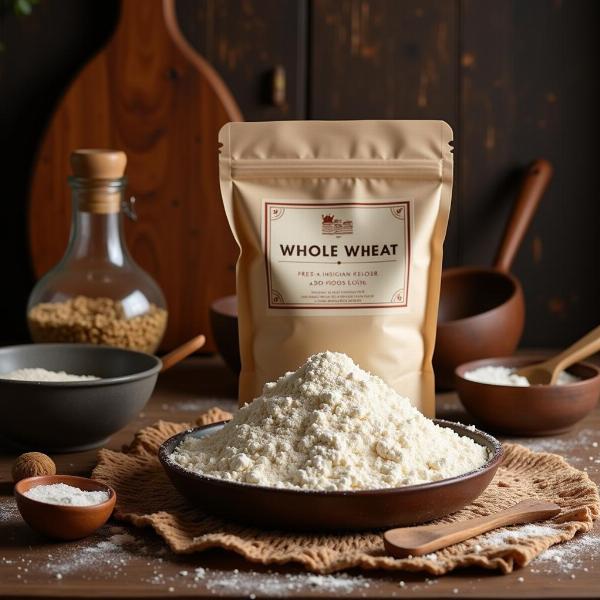Whole wheat, a staple in many diets, offers numerous health benefits. Understanding its meaning in Hindi can be helpful for anyone interested in Indian cuisine, nutrition, or simply expanding their vocabulary. This article explores the various Hindi translations of “whole wheat,” their cultural significance, and the nutritional advantages of incorporating this grain into your diet.
What Does Whole Wheat Mean in Hindi?
The most common Hindi translation for “whole wheat” is गेहूं का आटा (gehun ka atta). This literally translates to “wheat flour,” but in the context of Indian cooking, it generally refers to whole wheat flour. You might also encounter आटा (atta) used on its own, particularly when the context is clear. Another term used, especially when discussing the whole grain itself, is गेहूं (gehun), which simply means “wheat.” While technically गेहूं (gehun) can refer to both whole wheat and refined wheat, in many everyday conversations, it implies whole wheat, especially when discussing the benefits of consuming whole grains.
 Whole Wheat Flour in India
Whole Wheat Flour in India
Understanding these nuances can be particularly important when shopping for ingredients in India or following Hindi recipes. While “whole wheat” might be explicitly stated on packaged products, in local markets, it’s more common to use the generic terms. Knowing the context and asking clarifying questions can ensure you get the correct type of flour.
Nutritional Benefits of Whole Wheat (Gehun ka Atta)
Whole wheat is a nutritional powerhouse. Unlike refined wheat, which has the bran and germ removed, whole wheat retains all three parts of the grain kernel: the bran, the germ, and the endosperm. This makes it significantly richer in fiber, vitamins, and minerals.
- Fiber: Whole wheat is high in fiber, which aids digestion, promotes regularity, and can help manage cholesterol levels.
- Vitamins and Minerals: It’s a good source of B vitamins, iron, magnesium, and other essential nutrients.
- Protein: Whole wheat contains a moderate amount of protein, important for building and repairing tissues.
Whole Wheat in Indian Cuisine
Whole wheat flour (atta) is fundamental to Indian cuisine. It’s the primary ingredient in rotis, chapatis, parathas, and various other flatbreads that form the basis of many meals. Its versatility extends to other dishes, including puris, certain types of halwa, and even some savory snacks.
Whole Wheat vs. Refined Wheat: What’s the Difference?
While both are derived from wheat, whole wheat and refined wheat differ significantly in their nutritional profile. Refined wheat undergoes a milling process that strips away the bran and germ, leaving only the endosperm. This process removes much of the fiber, vitamins, and minerals, resulting in a less nutritious product. Choosing whole wheat over refined wheat provides considerably more health benefits.
Conclusion
Understanding the “whole wheat meaning in Hindi” opens up a deeper appreciation for Indian cuisine and its focus on healthy ingredients. Whether you’re exploring traditional recipes, shopping for groceries, or simply seeking to improve your diet, knowing the various terms for whole wheat in Hindi – गेहूं का आटा (gehun ka atta), आटा (atta), and गेहूं (gehun) – will prove invaluable. Embrace the nutritional power of whole wheat and enjoy its versatility in your culinary endeavors.
FAQ
- Is atta the same as whole wheat flour? Generally, yes, especially in the context of Indian cooking.
- Where can I buy whole wheat flour (atta)? You can find atta in most grocery stores, Indian specialty stores, and online.
- What are the benefits of eating whole wheat rotis? Whole wheat rotis are rich in fiber, aiding digestion and providing sustained energy.
- Is whole wheat good for weight loss? The fiber in whole wheat can contribute to feelings of fullness, potentially aiding weight management.
- Can I substitute whole wheat flour for all-purpose flour in recipes? While possible in some cases, adjustments might be needed due to the difference in protein content.
- Is gehun always whole wheat? While often used interchangeably in casual conversation, gehun can technically refer to both whole wheat and refined wheat. Clarification is always helpful.
- What is the difference between atta and maida? Atta is whole wheat flour, while maida is refined wheat flour.
Related Articles
- what is the meaning of nutrition in hindi
- what is the meaning of wheat in hindi
- hindi meaning of calories
Meaning-Hindi.in is your one-stop solution for professional Hindi translation services, catering to diverse needs, from business and legal documents to technical manuals and website localization. We pride ourselves on delivering accurate, culturally sensitive translations that meet the highest quality standards. Need help with your next translation project? Contact us at [email protected] or call us at +91 11-4502-7584. Meaning-Hindi.in is your trusted partner for all your Hindi translation needs.